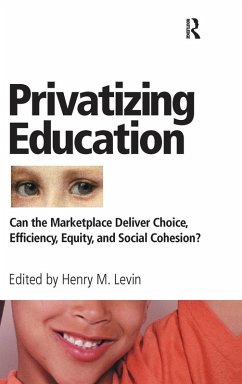Henry Levin
Privatizing Education
Can The School Marketplace Deliver Freedom Of Choice, Efficiency, Equity, And Social Cohesion?
Henry Levin
Privatizing Education
Can The School Marketplace Deliver Freedom Of Choice, Efficiency, Equity, And Social Cohesion?
- Gebundenes Buch
- Merkliste
- Auf die Merkliste
- Bewerten Bewerten
- Teilen
- Produkt teilen
- Produkterinnerung
- Produkterinnerung
An insightful and timely look at one of the hottest policy issues in education today: the initiative to move education from the public sector to the private sector.
Andere Kunden interessierten sich auch für
![Privatizing Educational Choice Privatizing Educational Choice]() Clive R BelfieldPrivatizing Educational Choice238,99 €
Clive R BelfieldPrivatizing Educational Choice238,99 €![Education and Climate Change Education and Climate Change]() Education and Climate Change217,99 €
Education and Climate Change217,99 €![A Developing Discourse in Music Education A Developing Discourse in Music Education]() Keith SwanwickA Developing Discourse in Music Education205,99 €
Keith SwanwickA Developing Discourse in Music Education205,99 €![Values in Education Values in Education]() Eva Burman / Lorraine Ling / Cooper Maxine / Joan Stephenson****Nfa****** / Joan Stephenson (eds.)Values in Education302,99 €
Eva Burman / Lorraine Ling / Cooper Maxine / Joan Stephenson****Nfa****** / Joan Stephenson (eds.)Values in Education302,99 €![Literature and Philosophical Play in Early Childhood Education Literature and Philosophical Play in Early Childhood Education]() Viktor JohanssonLiterature and Philosophical Play in Early Childhood Education195,99 €
Viktor JohanssonLiterature and Philosophical Play in Early Childhood Education195,99 €![Primary Teacher Education Primary Teacher Education]() Primary Teacher Education249,99 €
Primary Teacher Education249,99 €![Social Studies and Diversity Education Social Studies and Diversity Education]() Social Studies and Diversity Education224,99 €
Social Studies and Diversity Education224,99 €-
-
-
An insightful and timely look at one of the hottest policy issues in education today: the initiative to move education from the public sector to the private sector.
Hinweis: Dieser Artikel kann nur an eine deutsche Lieferadresse ausgeliefert werden.
Hinweis: Dieser Artikel kann nur an eine deutsche Lieferadresse ausgeliefert werden.
Produktdetails
- Produktdetails
- Verlag: Routledge
- Seitenzahl: 386
- Erscheinungstermin: 7. Mai 2019
- Englisch
- Abmessung: 235mm x 157mm x 25mm
- Gewicht: 708g
- ISBN-13: 9780367098360
- ISBN-10: 0367098369
- Artikelnr.: 57108483
- Herstellerkennzeichnung
- Libri GmbH
- Europaallee 1
- 36244 Bad Hersfeld
- gpsr@libri.de
- Verlag: Routledge
- Seitenzahl: 386
- Erscheinungstermin: 7. Mai 2019
- Englisch
- Abmessung: 235mm x 157mm x 25mm
- Gewicht: 708g
- ISBN-13: 9780367098360
- ISBN-10: 0367098369
- Artikelnr.: 57108483
- Herstellerkennzeichnung
- Libri GmbH
- Europaallee 1
- 36244 Bad Hersfeld
- gpsr@libri.de
Henry Levin
Introduction
Chapter 1: Studying Privatization in Education Henry M. Levin
Introduction
Setting the Agenda
Chapter 2: Educational Vouchers and The Media Lee D. Mitgang and Christopher V. Connell
The Stakes and The Stakeholders
The Medias Challenges
What Can Be Done? Implementation Issues
Chapter 3: The Legal Status of Privatization and Vouchers in Education Frank R. Kemerer
Privatization Within the Public Sector
Vouchers, Tax Deductions, and Tax Credits
Stakeholders and The Research Agenda
Summary
Chapter 4: Information and Choice in Educational Privatization Mark Schneider
Parents as Stakeholders: Choice at the Individual Level
The Benefits and Costs of Gathering Information about Public Goods
Not Everyone Needs to Be Informed: The Concept of the Marginal Consumer
The Role of Other Stakeholders in the Provision of Information
The Role of Other Levels of Government and Business as Stakeholders
Increasing Information Levels
Constructing an Internet Site for Washington, DC Schools
Stratification in the Use of Information
Setting an Agenda for Schools and Information Preschools and Higher Education
Chapter 5: Preschools and Privatization Ellen Magenheim
Introduction
Who Are the Stakeholders with an Interest in This Issue and What Are Their Interests and Concerns?
What Types of Studies Might Address These Concerns?
Conclusions
Chapter 6: Privatization in Higher Education Arthur Levine
The Major Actors
The Implications for Higher Education
Research Questions International Dimensions
Chapter 7: Privatization Through Vouchers in Developing Countries: The Cases of Chile and Colombia Martin Carnoy and Patrick J. McEwan
Introduction
Vouchers and Reform in Chile, 1980-1996
Lessons from the Chilean Voucher Plan
Targeted Vouchers in Colombia
Lessons from the Colombian Voucher Plan
Conclusions
Chapter 8: Privatization in Industrialized Countries Geoffrey Walford
Introduction
Privatization in England
Chapter 1: Studying Privatization in Education Henry M. Levin
Introduction
Setting the Agenda
Chapter 2: Educational Vouchers and The Media Lee D. Mitgang and Christopher V. Connell
The Stakes and The Stakeholders
The Medias Challenges
What Can Be Done? Implementation Issues
Chapter 3: The Legal Status of Privatization and Vouchers in Education Frank R. Kemerer
Privatization Within the Public Sector
Vouchers, Tax Deductions, and Tax Credits
Stakeholders and The Research Agenda
Summary
Chapter 4: Information and Choice in Educational Privatization Mark Schneider
Parents as Stakeholders: Choice at the Individual Level
The Benefits and Costs of Gathering Information about Public Goods
Not Everyone Needs to Be Informed: The Concept of the Marginal Consumer
The Role of Other Stakeholders in the Provision of Information
The Role of Other Levels of Government and Business as Stakeholders
Increasing Information Levels
Constructing an Internet Site for Washington, DC Schools
Stratification in the Use of Information
Setting an Agenda for Schools and Information Preschools and Higher Education
Chapter 5: Preschools and Privatization Ellen Magenheim
Introduction
Who Are the Stakeholders with an Interest in This Issue and What Are Their Interests and Concerns?
What Types of Studies Might Address These Concerns?
Conclusions
Chapter 6: Privatization in Higher Education Arthur Levine
The Major Actors
The Implications for Higher Education
Research Questions International Dimensions
Chapter 7: Privatization Through Vouchers in Developing Countries: The Cases of Chile and Colombia Martin Carnoy and Patrick J. McEwan
Introduction
Vouchers and Reform in Chile, 1980-1996
Lessons from the Chilean Voucher Plan
Targeted Vouchers in Colombia
Lessons from the Colombian Voucher Plan
Conclusions
Chapter 8: Privatization in Industrialized Countries Geoffrey Walford
Introduction
Privatization in England
Introduction
Chapter 1: Studying Privatization in Education Henry M. Levin
Introduction
Setting the Agenda
Chapter 2: Educational Vouchers and The Media Lee D. Mitgang and Christopher V. Connell
The Stakes and The Stakeholders
The Medias Challenges
What Can Be Done? Implementation Issues
Chapter 3: The Legal Status of Privatization and Vouchers in Education Frank R. Kemerer
Privatization Within the Public Sector
Vouchers, Tax Deductions, and Tax Credits
Stakeholders and The Research Agenda
Summary
Chapter 4: Information and Choice in Educational Privatization Mark Schneider
Parents as Stakeholders: Choice at the Individual Level
The Benefits and Costs of Gathering Information about Public Goods
Not Everyone Needs to Be Informed: The Concept of the Marginal Consumer
The Role of Other Stakeholders in the Provision of Information
The Role of Other Levels of Government and Business as Stakeholders
Increasing Information Levels
Constructing an Internet Site for Washington, DC Schools
Stratification in the Use of Information
Setting an Agenda for Schools and Information Preschools and Higher Education
Chapter 5: Preschools and Privatization Ellen Magenheim
Introduction
Who Are the Stakeholders with an Interest in This Issue and What Are Their Interests and Concerns?
What Types of Studies Might Address These Concerns?
Conclusions
Chapter 6: Privatization in Higher Education Arthur Levine
The Major Actors
The Implications for Higher Education
Research Questions International Dimensions
Chapter 7: Privatization Through Vouchers in Developing Countries: The Cases of Chile and Colombia Martin Carnoy and Patrick J. McEwan
Introduction
Vouchers and Reform in Chile, 1980-1996
Lessons from the Chilean Voucher Plan
Targeted Vouchers in Colombia
Lessons from the Colombian Voucher Plan
Conclusions
Chapter 8: Privatization in Industrialized Countries Geoffrey Walford
Introduction
Privatization in England
Chapter 1: Studying Privatization in Education Henry M. Levin
Introduction
Setting the Agenda
Chapter 2: Educational Vouchers and The Media Lee D. Mitgang and Christopher V. Connell
The Stakes and The Stakeholders
The Medias Challenges
What Can Be Done? Implementation Issues
Chapter 3: The Legal Status of Privatization and Vouchers in Education Frank R. Kemerer
Privatization Within the Public Sector
Vouchers, Tax Deductions, and Tax Credits
Stakeholders and The Research Agenda
Summary
Chapter 4: Information and Choice in Educational Privatization Mark Schneider
Parents as Stakeholders: Choice at the Individual Level
The Benefits and Costs of Gathering Information about Public Goods
Not Everyone Needs to Be Informed: The Concept of the Marginal Consumer
The Role of Other Stakeholders in the Provision of Information
The Role of Other Levels of Government and Business as Stakeholders
Increasing Information Levels
Constructing an Internet Site for Washington, DC Schools
Stratification in the Use of Information
Setting an Agenda for Schools and Information Preschools and Higher Education
Chapter 5: Preschools and Privatization Ellen Magenheim
Introduction
Who Are the Stakeholders with an Interest in This Issue and What Are Their Interests and Concerns?
What Types of Studies Might Address These Concerns?
Conclusions
Chapter 6: Privatization in Higher Education Arthur Levine
The Major Actors
The Implications for Higher Education
Research Questions International Dimensions
Chapter 7: Privatization Through Vouchers in Developing Countries: The Cases of Chile and Colombia Martin Carnoy and Patrick J. McEwan
Introduction
Vouchers and Reform in Chile, 1980-1996
Lessons from the Chilean Voucher Plan
Targeted Vouchers in Colombia
Lessons from the Colombian Voucher Plan
Conclusions
Chapter 8: Privatization in Industrialized Countries Geoffrey Walford
Introduction
Privatization in England








